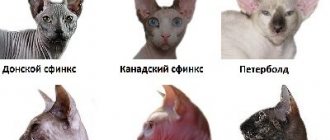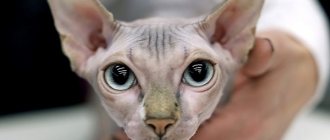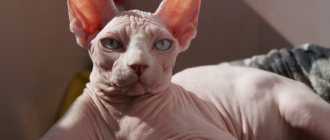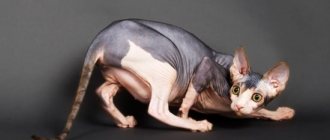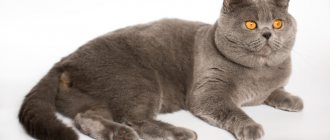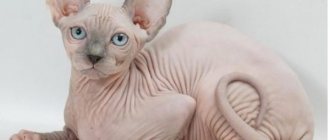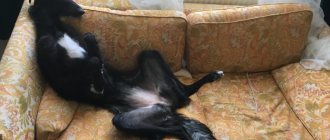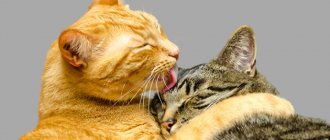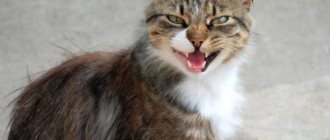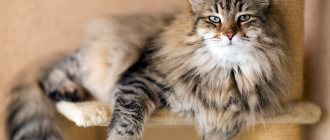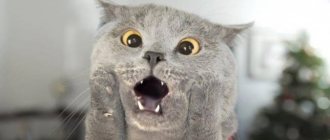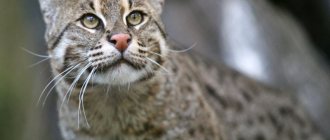The Don Sphynx is a cat breed that appeared due to a spontaneous mutation. She is relatively young, but is already popular and loved among admirers of “naked” cats, which is not at all surprising. Don Chaks are hot and soft to the touch, peaceful and affectionate in nature, and there is no hair at all around the house. Today we will tell you in detail about the Don Sphynx, we have prepared a detailed description of the breed with photos and videos, including advice on maintenance and care, as well as reviews about the breed from the owners, prices for kittens and much, much other useful information.
History of the breed
In short, one fine evening, one young woman, returning home from work, saw a lost, lonely kitten on the road. She took him in her arms, and in her hands the fluffy ball began to tremble violently. A girl named Elena took pity on him and decided to take him home.
Days and weeks of the month passed, and suddenly the woman noticed that her cat, whom she named Varvara, began to lose her fur greatly. The decision was made to seek advice from a veterinarian.
Elena began to have doubts that the cat was sick and that adequate treatment must be taken immediately. But, to the owner’s surprise, the cat was completely healthy, active, cheerful, and the doctor did not diagnose any abnormalities in his health. Hairlessness turned out to be resistant to any procedures and began to be inherited. Later it was established that the gene causing the mutation is dominant.
As a result of the first mating, the cat gave birth to a litter, one kitten of which was given to Irina Nemykina. Then followed a long process of breeding the breed, and only with the birth of Chita, the daughter of Varvara and the local handsome Vasily, did the story of the origin of the Don Sphynx begin. Until 1990, they did not make any impression on felinological organizations, and Irina Nemykina had to make a lot of efforts to get the breed registered with the WCF, which only happened in 1996. Associations have adopted abbreviations for the name of the Don Sphynx: DSP - according to the FIFe classification, DSX - according to the WCF classification.
The Don Sphynx is a relatively young breed of cat, but it has already been used to breed another breed of cat - the St. Petersburg Sphynx or Peterbald.
Video review about cats of the Don Sphynx breed:
History of the Don Sphynx breed
The Don Sphinxes owe their origin to His Majesty's chance.
In 1986, a resident of Rostov-on-Don, Elena Kovaleva, picked up an exhausted stray kitten on the street, which was thoroughly mocked by local schoolchildren. The tiny creature, which turned out to be a cat, was emaciated, and in addition, had a somewhat shabby appearance, which the new owner attributed to lichen. At first, Varvara—that’s the name of the mustachioed, purring creature—didn’t leave veterinarians’ offices. But since the strange baldness stubbornly refused to respond to treatment, the animal was left alone, without becoming interested in the amazing mutation that gave the kitty a hairless back. However, one specialist did show attention to the mongrel foundling, and it turned out to be Irina Nemykina. For several years, the breeder maintained a close relationship with Elena Kovaleva and her ward, and when in 1990 Varvara acquired offspring even more hairless than herself, Irina took one of the kittens, whom she later named Chita. When Chita reached sexual maturity, she was immediately mated with a European Shorthair to produce even more spectacular offspring. The fact is that Varvara’s daughter was not completely hairless and had curly hair on her paws, as well as, although rarely, a pubescent tail. Her kittens were born the same way, which did not stop them from finding their fans and successfully traveling to exhibitions. Soon, the desire to get a completely hairless purr pushed Irina Nemykina into inbreeding, that is, at some point the breeder simply bred Chita with her son, Hannibal. The experiment went well, and in due time the cat brought several babies, one of which turned out to be completely bald and received the nickname Basya Myth.
In 1997, the Don Sphynx was recognized by the WCF, after which the breed began to gain popularity outside of Russia. At the same time, the gene pool of Rostov cats still left much to be desired. Moreover, the unlucky cat family had to be regularly pumped up, involving “third-party producers”, who usually became short-haired European mousecatchers. Only in the early 2000s did the crossing of Don Sphynxes with other breeds begin to gradually fade away, as the number of healthy breeding individuals in domestic nurseries increased noticeably.
Interesting fact: as a result of mating the Don Sphynx with the Siamese, Russian Blue and Turkish Angora, an independent branch of the breed was born - the Peterbald.
Description of the breed
Don Sphynxes are massive cats with strong bones and developed muscles, soft and warm to the touch with a characteristic feature - the absence of hair. The size of cats is average, with males being much larger than females. Next, we will go through the description of this cat breed in detail.
Head and muzzle
The Don Sphynx has a wedge-shaped head with clearly defined cheekbones and eyebrows. The cat's forehead is flat with many folds that fan out over the eyes. The cat's nose is of medium length, the muzzle is slightly rounded with a slight pinch. The Don Sphynx has strong and large teeth, long upper clicks, which can even peek out from under the lip. Sphynx ears are set high, slightly tilted forward and have rounded ends. Their eyes are almond-shaped, medium-sized, obliquely spaced and slightly closed. Eye color can be any.
Body
The physique is proportional, strong, of medium length. Fairly wide croup. The hind legs are longer than the front legs, slender and proportional to the body. The tail is straight and long.
Skin and coat
The skin is elastic, bare and wrinkled, hot and velvety to the touch. Sphynxes tend to sweat and suffer from acne. Under the sun, the Sphynx's skin tans and becomes brighter. A thick mustache can be of any length or broken off. Wrinkles are desirable on the face, between the ears, around the shoulders, as well as on the legs and belly. A large number of folds should not affect the normal functioning of the body.
In winter, Don Sphynxes may develop sparse soft fluff all over their bodies.
Depending on the quality of the coat, the Don Sphynx is divided into four types
- Hairless (“rubber”, “plasticine”) - implies completely hairless skin. Typically, “rubber” kittens are born naked.
- Velor - the entire body is covered with a thin short fluff, which to the touch resembles the fabric of the same name. As they age, these cats may become bald.
- Flock - the skin is covered with short soft hair, which is almost invisible from afar, somewhat reminiscent of a peach. By the age of two, flock cats sometimes completely “undress.”
- Brush (derived from the English “brush” - brush, bristly) - cats with long, hard and crimped hair. Areas of baldness are often observed on the head, neck and abdomen. Brush sphinxes can periodically “dress” and “undress”, which is associated with many factors (hormonal imbalances, pregnancy, weather, castration and other reasons).
Brushes do not receive titles at shows, but are allowed for breeding. This is due to the fact that in a litter of two completely hairless Donets, weak kittens are usually born, with large mutations and often not viable.
There are no completely hairless sphinxes; residual hair is preserved behind the ears and on the nose, sometimes at the tip of the tail. In addition, a light invisible fluff remains on the skin.
Colors
Absolutely any color is allowed, including all types of patterns and combinations of shades with any amount of white.
Diseases and health problems
Representatives of this breed are more susceptible to various diseases than their other brothers. Since cats' eyes open from birth, the visual organs are predisposed to infectious diseases, conjunctivitis, corneal ulcers, and scleritis.
The coordination system is not thoroughly established in the first weeks of life, so the eyes are at risk of injury when colliding with any obstacles. Any lint should be removed from the eyes. The donkey saliva contains a glycoprotein that causes allergies. Since cats lick their naked body, it always contains an allergen.
Cats can suffer from shortening of the lower jaw, which is popularly called a carp bite. This is a congenital deviation, during which 2 rows of incisors are displaced, which ultimately cannot dock. In a mild form, the disease does not bother the pet, but a severe form can cause gingivitis.
Microphthalmos is a disease that causes decreased vision or complete blindness. Many babies may be born with eye tumors or cysts. These defects can be detected in the first week after birth and sometimes they require surgical intervention, which does not always completely eliminate them.
In every second litter, babies are born with a bent tail, a common condition. Such individuals are not intended for further reproduction. This disease is accompanied by additional defects that are incompatible with normal existence - underdeveloped intestines, shortening of the thoracic and cervical vertebrae, weakness of the anus, carp bite.
Character
The Don Sphynx breed is characterized by an interesting expression: “Not yet a person, but no longer a cat.” They have a gentle character, are attached to their owners, are active, and love attention and affection. Don Sphynx kittens aged 2-4 months are quite active, they are interested in literally everything that is around, regardless of the subject, they try to taste everything. Kittens are constantly looking for new fun, they love their surroundings, and if they are left alone in the house for a long time, they can become very bored and even cry.
During adolescence, they become calmer, pay less attention to games and give all their attention to their owners. They begin to distinguish who treats them better, caresses them more, who feeds them, plays with them, and treats them accordingly, in their own way. It is at this age that Sphynx cats’ character and temperament are finally established, and all the habits that they have acquired during this time are consolidated. Adult Don cats are the real pride of their owners. It should also be noted that the character of the Don Sphynx cat is different from the character of the Don Sphynx cat. Unneutered cats are almost always concerned about procreation.
The character of Don Sphynxes is greatly influenced by their content, the owners’ relationship with the animal, upbringing and genetic inclinations.
The character of the Don Sphynx
In the body of this alien creature hides a very vulnerable soul, yearning for close emotional contact with its owner. So the correct Don Sphynx is unusually soft (as soft as a representative of the cat family can be), not at all jealous and absolutely not prone to aggression. Anyone can offend this good-natured big-eared dog, but no one can make him angry, which makes “Donetsk” dogs ideal pets for families where young tomboys are growing up.
Meek and loving, the Don Sphynx is always happy to receive “calf tenderness,” but if the owner is not yet ready for an open manifestation of feelings, it is not a sin to push him a little. There are a lot of ways to do this, and Rostov cats have mastered almost all of them. In particular, any unoccupied knees in the house will certainly be tested by the Donetsk team for softness and elasticity, and their owner will be caressed to the point of semi-consciousness. At the same time, bald purrs do not suffer from excessive clinginess and do not try to impose their company on someone who does not need it.
In general, Don Sphynxes are moderately lazy creatures, equally willing to devote their free time to both standard cat pranks and lying on radiators. In childhood, they show strong curiosity and activity, but as they grow up, they become somewhat fed up with new impressions and look at life with slight indifference. The peacefulness and non-conflict nature of the breed is already a cliché, so feel free to release parrots, hamsters, guinea pigs and other representatives of the feathered and fluffy world from their cages - the Don Sphynx has nothing to do with them.
It is generally accepted that, intellectually, the “Donetsk people” are somewhat superior to their “woolen” relatives. Indeed, they are incredibly smart and savvy. For example, almost any adult cat knows how to deal with a door latch (long fingers, like those of an alien from an American blockbuster, come in handy here). In addition, they have excellent intuition: the Don Sphynx is always aware of when it is possible to cuddle with its owner, and when it is better to move away so as not to provoke the two-legged master to anger.
Reviews about the breed
Reviews from owners, of course, will not replace live communication, but they will help you get to know the breed better and create a certain collective image. Don Sphynxes are peaceful and absolutely non-aggressive cats that become strongly attached to humans, but remain independent and treat their owners as equals.
Owners talk about many pets as very smart and clean animals with their own character and habits that they have to put up with.
Among the Donchak people there are both “tame” and independent in approximately equal numbers.
The story of one cat:
To summarize, we highlight several character traits and features inherent in the breed of hairless cats originally from Rostov-on-Don:
- Don Sphynxes are not aggressive, they become strongly attached to their owners, they are clean and quite intelligent.
- They require a lot of attention;
- Talkative;
- They can be touchy, but not vindictive;
- Heat-loving, do not tolerate drafts and cold. Sometimes the cat will have to be dressed.
- They eat more and more often than other cat breeds;
- Don Chaks need daily care;
Before getting a Don Sphynx, evaluate your physical and financial capabilities. Do you have enough time to pay attention to this little child, play with him, caress him, feed him and wipe his bottom not occasionally, but regularly.
Character and education
Don Sphynxes, despite their stern appearance, are unusually friendly and sociable animals. They are very affectionate and are distinguished by great affection for their owner, striving to constantly be close to him.
Owners of this breed consider Sphynx cats to be very smart and smart cats. They can even be trained. True, due to their independent nature, they are not always in a hurry to carry out commands. These cats are very fond of any outdoor games; they can chase a ball or play with a mouse for a long time. Children are excellent partners for them in such games.
It doesn't take much time to toilet train a kitten. It happens that from the first time they bring him to the tray, the baby understands what they want from him. Thanks to their inquisitive mind, sphinxes quickly learn the rules of behavior and behave with great dignity.
A cat with such developed intelligence and extraordinary appearance should have an appropriate nickname. Therefore, when purchasing such a pet, it is advisable to take a responsible approach to the question of what to name it.
If you correctly organize all the conditions for a comfortable life for the Don Sphynx (food, skin care, outdoor games, etc.), then, we can say, a healthy and long life for the pet is guaranteed. And he, in turn, will respond to care with his love and devotion.
Maintenance and care
Don Sphynxes are adapted for life only in the greenhouse conditions of an apartment. Cold weather and drafts can lead to colds, so you need to take care of the availability of clothing for your pet. In summer, you should protect your cat from the negative effects of ultraviolet radiation. To ensure that your pet brings you joy, learn how to properly care for and feed it. Be sure to buy toys, feeding bowls, a scratching post, and a litter box for him.
Don Sphynxes are not a hypoallergenic breed and, like others, can cause an allergic reaction.
Don Sphynxes require attention, care and regular, very troublesome, daily care from the owner.
Donchak cats are bathed much more often than other cat breeds, approximately once a week using special shampoos. If this is not done, dark secretions from the sebaceous glands accumulate on the skin and an unpleasant odor appears. Every day it is advisable to wipe the skin between the fingers and folds, in the groin and on the tail with a damp cotton pad; these areas are more susceptible to dirt and rashes, especially in adolescence.
Sometimes bathing can be replaced by wiping with a damp towel or baby wipes. After water procedures, the skin should be dried well with a towel and lubricated with baby oil or moisturizer. Sphynxes have virtually no instinct to lick themselves, which is due to the lack of hair, so small kittens, and sometimes adult cats, have to wash their butts after “big things.” Due to the lack of eyelashes, the eyes of Donchaks require special care. They are regularly cleaned of acids and wiped with chamomile decoction or tea. Ears are cleaned approximately once a week. The claws on the front paws are trimmed once a week, and on the hind paws once every two weeks.
Necessary care accessories
Caring for a Sphynx will be much simpler and easier when the house has all the necessary means for this:
- Shampoo intended for hairless animals (a kitten needs a special one for children), and other cleansers (lotions, foams, etc.), wet wipes.
- Cotton pads, drops and ointments for eye care.
- Cotton swabs, boric acid and ear drops.
- Claw clipper.
Diet
It’s worth noting right away that the nutrition of hairless cats has a number of features. This is due to increased energy exchange and high heat transfer, that is, nutrition must correspond to rapid metabolism. It is recommended to feed the Sphinx 3-4 times a day in small portions. Be sure to follow the feeding regime.
Don Sphynxes can be fed natural food or ready-made food. The choice is always up to the owner.
If the cat is not picky, then you can choose a convenient diet and cook the food yourself. The basis of natural nutrition is meat, some porridge and vegetables; sometimes fermented milk products; once a week fish and raw quail egg. Vitamin and mineral supplements must be given in courses.
But if the Donetsk dog is very picky and cannot be provided with adequate nutrition with natural products, then it is better to opt for ready-made dry food of premium class and higher. High-calorie diets for domestic active cats or food designed specifically for hairless breeds are best suited.
Many Sphynx cats are prone to overeating, which leads to excess weight gain. The diet of such pets must be closely monitored.
Features of feeding a kitten
Every person who purchases a kitten has a huge responsibility for its maintenance and care. The main factor influencing the health of an animal is nutrition. Food for a small pet is selected especially carefully. Especially in the period from 3 to 5 months, when the kitten’s body is growing most actively, it is necessary to take a very responsible approach to preparing the diet. It should contain boiled fish (without bones), porridge, and offal. You can feed your baby raw meat, but first it must be kept in the refrigerator for at least 10 hours. It is very useful to add dill to food, but not all cats like its smell.
For babies under 9 months of age, there is a special dry food for kittens.
Health and life expectancy
Most often, Don Sphynxes have skin problems, and the reason is excessive secretion of the sebaceous glands, which is an excellent breeding ground for microbes and poor hygiene. To make a diagnosis, it is recommended to do a scraping and treatment is prescribed only based on its results.
A number of hereditary diseases are noted in Don Sphynxes:
- Microphthalmos – reduction of the eyeball. A congenital defect that leads to decreased vision and the development of other eye diseases;
- Kitten sleep syndrome most often occurs when two “rubber” Sphynxes are crossed. In children, underdevelopment of a vital gland, the thymus, is noted, which leads to death;
- Curvature of the spine in the caudal region is often associated with a number of other pathologies: underdevelopment of the intestines and skeletal system;
- Shortening of the lower jaw comes in varying degrees and has different effects on quality of life;
- Skin vasculitis is an inflammation of the walls of skin blood vessels, to which Donchas are most susceptible;
- Congenital entropion of the eyelids is corrected by surgery;
- Nipple hyperplasia occurs when drugs were used before pregnancy to suppress the female's sexual functions. The nipples swell, increase in size, and eventually they are recommended to be removed surgically.
There is an opinion that Don Sphynxes have a much higher body temperature than other cats, but this is not true. It fluctuates within normal limits – 38-39.5°C. In young animals it is closer to the upper limit, and in pregnant and old animals it is closer to the lower limit.
Life expectancy is on average 13 -14 years.
Video
* We invite you to watch a video about the Don Sphynx . In fact, in front of you is a playlist in which you can select and watch any of 20 videos about a given cat breed by simply clicking on the button in the upper right corner of the window. In addition, the material contains quite a lot of photos. By looking at them you can find out what the Don Sphynx looks like.
In this article:
|
Rate the material!
[Total votes: 0 Average: 0]
The Don Sphynx is an animal endowed with special charm and beauty. Some consider him ugly, but among true cat lovers there are many admirers of the breed. Don Sphynxes have a soft, affectionate character and an elegant appearance. They are very playful and can create entertainment out of nothing. They get along well with guests and other pets.
Choice of kitten and price
Little Don Sphynx kittens make a fascinating impression on people. Imagine the following picture - plump, naked, folded lumps are constantly tumbling.
They are very curious, which justifies their early intellectual development. One of the features of the Don Sphynx is that kittens open their eyes already in the first 1-3 days of life, and not after 2 weeks, like others.
Regardless of the purpose of the purchase: for yourself, for an exhibition for breeding, you need to make sure that the baby is healthy. He should be active, playful, mobile and clean with a rounded, elastic tummy. The cost of Don Sphynxes is influenced by many factors: the merits of the parents, coat type, gender, class of the animal (for home, breeding, exhibitions), etc.
On Avito, kittens without documents, and therefore without confirmation of breed, are sold at a price of up to 5 thousand rubles.
Pet-class kittens (for castration/sterilization) with documents cost from 15 thousand rubles.
Animals for breeding and show careers can cost from 35,000 rubles. and higher.
Characteristics of sphinxes
By nature, the creatures from the Don are kind, friendly and sociable. Many owners describe the breed as “kissing.” A cat with smooth, soft skin constantly wants to be petted and rewarded for good behavior. And the pet itself always reaches out to the owner to rub against him, expressing his adoration and devotion. Usually, a feline family member chooses only one “leader” from among all members of the household, whom he will love more and obey more often.
How to train a Don Sphynx to use a litter box
Hairless Don pets are unlikely to be jealous of a person’s other pets. Although, if a Donetsk resident feels that he received less affection and attention than others, he will definitely be offended. The cat will not take revenge or commit meanness, but will only cast an expressive glance at the owner, full of reproach.
In childhood and adolescence, Don Sphynxes are very active and playful. Young hairless meteors rush around the entire perimeter of the apartment - from floor to ceiling. Over time, many individuals become calmer and wiser. Although at any age they will be happy to communicate with people. Cats have a hard time being separated from their beloved “leader,” so experienced owners advise getting another animal.
Don cats are reasonable and understanding, so they are calm about hygienic procedures and are reserved even when examined and vaccinated by a veterinarian. They are also patient when playing with children and show a gentle character. These animals defend themselves much less often than others with the help of teeth and claws. Therefore, they are safe for families with children.
They say that such cats have healing energy and properties. Although this has not been scientifically proven, this assumption is difficult to ignore. Practice shows that hairless Rostov cats are more likely than other cats to engage in “doctoring.” They intuitively find the diseased area, lay their whole warm, warming body on it and send healing impulses inside.
Photos
Photos of Don Sphynx cats:
Health
Strong and strong animals. By adhering to proper care, they will not cause unnecessary worries.
The Don Sphynx is a cat breed that copes with childbirth on its own, without the help of its owner. Almost always babies are born quite quickly. The kittens that are born are strong. On the third day they can already see.
Occasionally, kittens are born with their eyes slightly open. In this case, you need to immediately treat them with a weak solution of potassium permanganate. This will prevent the spread of infection, the eyes will not become sour and watery.
